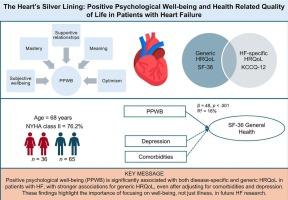心脏的一线希望:心力衰竭患者积极的心理健康和健康相关的生活质量
IF 3.7
2区 医学
Q1 PSYCHIATRY
引用次数: 0
摘要
包括抑郁症在内的心理困扰与心血管疾病的不良健康结果有关。新出现的证据表明,积极的心理健康(PPWB),包括乐观和目标,也可能影响健康结果。然而,PPWB在心力衰竭(HF)中的作用尚不清楚,心力衰竭是一种高度普遍和进行性的疾病,严重影响健康相关的生活质量(HRQoL)。本研究探讨心衰患者PPWB与HRQoL的关系。方法在这项横断面研究中,101名心内科医院的心衰患者完成了PPWB (BIT)、抑郁(PHQ-9)、疾病特异性HRQoL (KCCQ-12)和通用HRQoL (SF-36)的验证测量。进行Spearman相关性和分层多元线性回归分析,调整性别、年龄、抑郁和合并症(Charlson共病指数)。结果参与者(平均年龄= 68.2±9.9;36%为女性;76%的NYHA II级患者报告PPWB中度(BIT = 3.7±0.7),“一般”疾病特异性HRQoL (KCCQ-12总分= 61.3±23),低于平均水平的一般HRQoL (SF-36 General Health = 36.2±19.4)。PPWB与所有KCCQ-12和SF-36分量表呈显著正相关,其中与SF-36一般健康的相关性最强(r = 0.58, p <;措施)。在多变量模型中,较高的BIT分数与较好的HRQoL相关,包括KCCQ-12- qol (β = 0.26, p = 0.012)、KCCQ-12社会限制(β = 0.26, p = 0.017)、KCCQ-12总分(β = 0.21, p = 0.042)、SF-36能量(β = 0.38, p <;措施),SF-36一般卫生(β= 0.48,p & lt;措施)。结论即使在调整合并症和抑郁因素后,ppwb与HF患者疾病特异性和一般HRQoL均显著相关。这些发现强调了在未来的心衰研究中关注幸福感而不仅仅是痛苦的重要性。本文章由计算机程序翻译,如有差异,请以英文原文为准。

The heart's silver lining: Positive psychological well-being and health related quality of life in patients with heart failure
Objective
Psychological distress, including depression, is linked to poor health outcomes in cardiovascular disease. Emerging evidence suggests that positive psychological well-being (PPWB), including optimism and purpose, may also impact health outcomes. However, the role of PPWB in heart failure (HF), a highly prevalent and progressive condition that severely affects health-related quality of life (HRQoL), remains unclear. This study explored the association between PPWB and HRQoL in patients with HF.
Methods
In this cross-sectional study, 101 patients with HF from a cardiac hospital completed validated measures of PPWB (BIT), depression (PHQ-9), disease-specific HRQoL (KCCQ-12), and generic HRQoL (SF-36). Spearman correlations and hierarchical multiple linear regression analyses were conducted, adjusting for sex, age, depression, and comorbidities (Charlson Comorbidity Index).
Results
Participants (mean age = 68.2 ± 9.9; 36 % female; 76 % NYHA class II) reported moderate PPWB (BIT = 3.7 ± 0.7), “fair” disease-specific HRQoL (KCCQ-12 Total score = 61.3 ± 23), and below-average generic HRQoL (SF-36 General Health = 36.2 ± 19.4). PPWB was significantly positively correlated with all KCCQ-12 and SF-36 subscales, with the strongest correlation for SF-36 General Health (r = 0.58, p < .001). In multivariable models, higher BIT scores were associated with better HRQoL across domains, including KCCQ-12-QoL (β = 0.26, p = .012), KCCQ-12 Social Limitations (β = 0.26, p = .017), KCCQ-12 Total score (β = 0.21, p = .042), SF-36 Energy (β = 0.38, p < .001), and SF-36 General Health (β = 0.48, p < .001).
Conclusion
PPWB is significantly associated with both disease-specific and generic HRQoL in patients with HF, even after adjusting for comorbidities and depression. These findings highlight the importance of focusing on well-being, not just distress, in future HF research.
求助全文
通过发布文献求助,成功后即可免费获取论文全文。
去求助
来源期刊

General hospital psychiatry
医学-精神病学
CiteScore
9.60
自引率
2.90%
发文量
125
审稿时长
20 days
期刊介绍:
General Hospital Psychiatry explores the many linkages among psychiatry, medicine, and primary care. In emphasizing a biopsychosocial approach to illness and health, the journal provides a forum for professionals with clinical, academic, and research interests in psychiatry''s role in the mainstream of medicine.
 求助内容:
求助内容: 应助结果提醒方式:
应助结果提醒方式:


